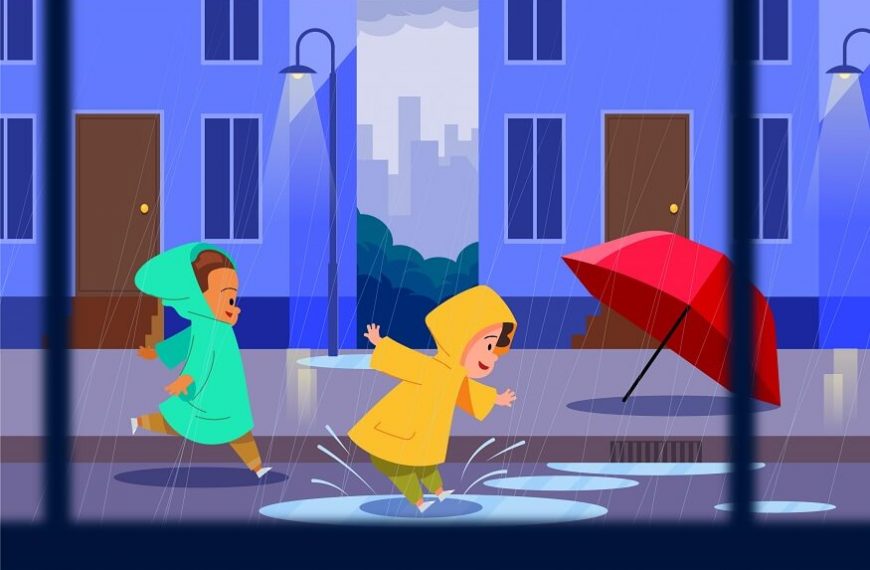Rainy season brings not only relief from the summer heat but also the risk of various diseases. The increased moisture and humidity provide the perfect breeding ground for numerous disease-causing organisms. Particularly for children, who are naturally curious and love playing in the rain, the threat is amplified. This article aims to highlight common illnesses in the rainy season, specifically the diseases during the rainy season that can affect our little ones and also delve into how to prevent diseases in the rainy season.
Monsoon diseases in kids: Knowing what to look out for
Viral Infections
Viral infections are arguably amongst the most common illnesses in the rainy season. These include colds, influenza, and respiratory syncytial virus (RSV), which primarily affect the upper respiratory tract. Symptoms include coughing, sneezing, a runny nose, and fever.
Gastrointestinal Diseases
The rainy season also aggravates gastrointestinal problems such as diarrhea, vomiting, and stomach aches, often caused by contaminated food and water. These are particularly prevalent monsoon diseases in kids as they tend to have lower immunity and are more prone to consume contaminated food and water.
Malaria and Dengue
Mosquito-borne diseases like Malaria and Dengue are typical diseases during the rainy season. They are caused by the bite of an infected mosquito, leading to high fever, severe headache, body aches, and in severe cases, it can even be life-threatening.
Typhoid
Typhoid is another monsoon disease in kids caused by Salmonella typhoid bacteria, often spread through contaminated food and water. The symptoms include high fever, headache, abdominal pain, and sometimes a rash.
Hepatitis A
Hepatitis A, a viral liver disease, can be contracted during the rainy season, typically due to the consumption of contaminated food or water. Symptoms may include fatigue, nausea, abdominal pain, and jaundice.
Battling the rainy season: How to prevent diseases in the rainy reason
Now that we know the risks, the next step is understanding how to prevent diseases in the rainy season. Here are some key preventive measures:
Boost Immunity
Keeping your child’s immunity strong is the first line of defense against these common illnesses in the rainy season. Ensure a balanced diet rich in fruits, vegetables, and proteins, and encourage regular physical activity.
Hygiene Practices
Teaching kids about good hygiene is one of the most effective ways to prevent diseases in the rainy season. Encourage them to wash their hands frequently, especially before meals, after using the toilet, and when they come home from playing outside.
Safe Food and Water
Ensure your children only consume safe, home-cooked food during the monsoon. Make sure the water they drink is either boiled or purified to avoid waterborne diseases.
Preventive Vaccination
Vaccination is a powerful tool in the fight against monsoon diseases in kids. Vaccines for diseases such as Hepatitis A, Influenza, and Typhoid can provide significant protection.
Avoid Stagnant Water
Mosquito-borne diseases are prevalent during the rainy season. To prevent these, make sure there is no stagnant water around your house where mosquitoes can breed.
Further insight into the impact of the rainy season on children’s health
While the previous section explored the primary diseases during the rainy season, it’s essential to recognize the broader impact this season has on children’s health. For instance, the damp and cold weather can exacerbate pre-existing conditions, like asthma and allergies. Kids with skin sensitivities might also experience an increase in rashes and fungal infections due to the higher humidity.
Allergies and Asthma
During the monsoons, children may experience an upsurge in allergy symptoms and asthma attacks. The moist environment serves as a breeding ground for mold spores and dust mites, which are common triggers for these conditions. Common symptoms include sneezing, runny nose, red, watery eyes, and difficulty in breathing.
Skin Infections
The rainy season also increases the incidence of skin infections among children. The moist conditions facilitate the growth of various fungi, leading to fungal infections. Ringworm and Athlete’s foot are two common fungal infections that children might contract during this season.
Eye Infections
Eye infections, like conjunctivitis, also frequently occur during the rainy season. It spreads through direct contact and can cause redness, itching, and discharge from the eyes.
Augmenting the Prevention Strategy: How to Prevent Diseases in Rainy Season
Building on the previously mentioned preventive measures, here are additional steps to take to ensure children’s health during the rainy season.
Regular Health Check-ups
Routine health check-ups allow for early detection and treatment of potential health issues. Regular doctor visits can help monitor your child’s overall health and provide necessary interventions in time.
Allergy-proof your home
Preventing allergens from thriving in your home environment can significantly reduce allergy and asthma attacks. Regular cleaning, particularly in areas that are often damp, like bathrooms and kitchens, can help control mold growth. Using dust-proof covers on mattresses and pillows can also restrict dust mites.
Skin Care
Ensure your children dry off properly after getting wet in the rain or after a bath. Pay extra attention to areas like the spaces between the toes and underarms. Use antifungal talc to keep these areas dry and prevent fungal infections.
Eye Care
Teach your children not to touch or rub their eyes with dirty hands to prevent eye infections. If an infection is suspected, seek medical advice promptly to prevent it from worsening or spreading to others.
Engaging Children in Disease Prevention
Educating children on the risks and involving them in preventive measures can make the process easier. Making them understand why they need to follow certain rules can help them adhere to these practices even when not under adult supervision. Reinforce the importance of actions like handwashing and avoiding stagnant water in a fun, engaging way. For example, make up a song about handwashing or turn clearing potential mosquito-breeding spots into a game.
Rainy season comes with its share of risks, but with the right preventive measures, you can ensure your children’s safety and health. Remember, the key to managing the common illnesses in the rainy season is a balance of awareness, preparation, and timely action. With these strategies, you can help your children embrace the beauty and fun of the rainy season, without the risk of disease.
Also, if you are yet to enroll your kid to the right preschool, then EuroKids should be on your list. With an experienced team of professionals, we focus on making the learning experience fun and engaging for the little one.


















